看了老赵写的性能测试文章(数组排序方法的性能比较(上):注意事项及试验),的确长了不少见识,不过我对他的结论也不完全同意,为此针对我的测试环境进行一翻改造。
第一条:ASP.NET执行.NET代码的时候,使用的是IIS进程中托管的CLR,它的配置和直接运行.NET应用程序时不同(不同的CLR托管方式配置很可能不一样——例如SQL Server里托管的CLR)。
所以我放弃asp.net,选用Console应用程序来进行性能测试。
第二条:更改数据结果,生成一个序号号分散的List<T>。
1:生成一个大的随机数组:
var array = Enumerable.Repeat(0, 500001).Select(_ => random.Next()).ToArray();
2:利用随机数组的元素做为我们测试用的List<T>子元素Person类的ID
 代码
代码
for (int i = 0; i < 500001; i++)
{
Person p = new Person();
p.firstName = i.ToString() + "firstName";
p.lastName = i.ToString() + "lastName";
p.ID = array[i];
list.Add(p);
}
第三条:增加测试次数。之前我只排序一次,这里我来排序5次。
 代码
代码
Stopwatch sw = new Stopwatch();
sw = new Stopwatch();
sw.Start();
for (int i = 0; i < iCount; i++)
{
list.Sort(new PersonComparer());
}
sw.Stop();
Console.WriteLine("Sort排序用时" + sw.ElapsedMilliseconds.ToString());
sw = new Stopwatch();
sw.Start();
for (int i = 0; i < iCount; i++)
{
var pn = (from m in list
orderby m.ID descending
select m).ToList<Person>();
}
sw.Stop();
Console.WriteLine("linq排序用时" + sw.ElapsedMilliseconds.ToString());
第四条:增加release版本的测试。
说明:代码中相关类如下:
 代码
代码
{
public string firstName
{ get; set; }
public string lastName
{ get; set; }
public int ID
{ get; set; }
}
public class PersonComparer : IComparer<Person>
{
public int Compare(Person x, Person y)
{
return x.ID.CompareTo(y.ID);
}
}
测试结果:还是和之前的结果一样,LINQ在排序上明显有优势。
我们来换一种测试,我是对List<T>来进行测试,其中的T是一个对象,并不是数值性的,老赵文中排序的是array[int],下面代码中的array就是之前生成的无序数组。测试代码如下:
 代码
代码
sw.Start();
for (int i = 0; i < iCount; i++)
{
SortWithDefaultComparer(array);
}
sw.Stop();
Console.WriteLine("Sort 数组排序用时" + sw.ElapsedMilliseconds.ToString());
sw = new Stopwatch();
sw.Start();
for (int i = 0; i < iCount; i++)
{
SortWithLinq(array);
}
sw.Stop();
Console.WriteLine("linq 数组排序用时" + sw.ElapsedMilliseconds.ToString());
测试结果:和老赵文中一样,LINQ会差很多。
比较:老赵和我的测试环境还是一个特别大的差别,他在文中有这段话:每次生成新的序列也会带来开销,如果使用List<T>的话,填充元素的开销会很大,但如果是普通数组的话,就可以用性能很高的Array.Copy方法了。
问题就在这,我的方法中是对Person类排序,排序字段为ID,而老赵排序的是int[],这里我再写一个测试,测试Array<T>的性能,当然这个T并非int,而是Person。
1:我们先创建一个Person[],这个Person[]的ID和上面一样,是无序的。
 代码
代码
for (int i = 0; i < 500001; i++)
{
Person p = new Person();
p.firstName = i.ToString() + "firstName";
p.lastName = i.ToString() + "lastName";
p.ID = array[i];
alist[i] = p;
}
2:调用Array.Sort方法。
 代码
代码
{
Array.Sort(array, new PersonComparer());
}
static T[] CloneArray<T>(T[] source)
{
var dest = new T[source.Length];
Array.Copy(source, dest, source.Length);
return dest;
}
sw = new Stopwatch();
sw.Start();
for (int i = 0; i < iCount; i++)
{
SortWithDefaultComparerList(CloneArray(alist ));
sw.Stop();
Console.WriteLine("Arr数组排序用时" + sw.ElapsedMilliseconds.ToString());
测试结果:同样是LINQ方法更优。
总结:对于List<T>的排序,从性能角度来看:
1:T的类型会对结果产生重要影响,并不能片面的说LINQ方式排序更强于或者差于List.Sort或者是Array.Sort。
2:当T的属性越来越多时, LINQ方式的优势会更加明显。
本文可执行代码见文末:
老赵的codertimer执行情况和我的测试结果一样。
下图是debug下的结果,linq 效果明显,release版本下,linq稍微强一点点,相差无几。

release版本

 代码
代码
using System.Collections.Generic;
using System.Linq;
using System.Text;
using System.Collections;
using System.Diagnostics;
using System.Threading;
using System.Runtime.InteropServices;
namespace ConsoleApplication1
{
public static class CodeTimer
{
public static void Initialize()
{
Process.GetCurrentProcess().PriorityClass = ProcessPriorityClass.High;
Thread.CurrentThread.Priority = ThreadPriority.Highest;
Time("", 1, () => { });
}
public static void Time(string name, int iteration, Action action)
{
if (String.IsNullOrEmpty(name)) return;
// warm up
action();
// 1.
ConsoleColor currentForeColor = Console.ForegroundColor;
Console.ForegroundColor = ConsoleColor.Yellow;
Console.WriteLine(name);
// 2.
GC.Collect(GC.MaxGeneration, GCCollectionMode.Forced);
int[] gcCounts = new int[GC.MaxGeneration + 1];
for (int i = 0; i <= GC.MaxGeneration; i++)
{
gcCounts[i] = GC.CollectionCount(i);
}
// 3.
Stopwatch watch = new Stopwatch();
watch.Start();
ulong cycleCount = GetCycleCount();
for (int i = 0; i < iteration; i++) action();
ulong cpuCycles = GetCycleCount() - cycleCount;
watch.Stop();
// 4.
Console.ForegroundColor = currentForeColor;
Console.WriteLine("\tTime Elapsed:\t" + watch.ElapsedMilliseconds.ToString("N0") + "ms");
Console.WriteLine("\tCPU Cycles:\t" + cpuCycles.ToString("N0"));
// 5.
for (int i = 0; i <= GC.MaxGeneration; i++)
{
int count = GC.CollectionCount(i) - gcCounts[i];
Console.WriteLine("\tGen " + i + ": \t\t" + count);
}
Console.WriteLine();
}
private static ulong GetCycleCount()
{
ulong cycleCount = 0;
QueryThreadCycleTime(GetCurrentThread(), ref cycleCount);
return cycleCount;
}
[DllImport("kernel32.dll")]
[return: MarshalAs(UnmanagedType.Bool)]
static extern bool QueryThreadCycleTime(IntPtr threadHandle, ref ulong cycleTime);
[DllImport("kernel32.dll")]
static extern IntPtr GetCurrentThread();
}
class Program
{
static void Main(string[] args)
{
var random = new Random(DateTime.Now.Millisecond);
var array = Enumerable.Repeat(0, 500001).Select(_ => random.Next()).ToArray();
List<Person> list = new List<Person>();
for (int i = 0; i < 500001; i++)
{
Person p = new Person();
p.firstName = i.ToString() + "firstName";
p.lastName = i.ToString() + "lastName";
p.ID = array[i];
list.Add(p);
}
Person[] alist = new Person[500001];
for (int i = 0; i < 500001; i++)
{
Person p = new Person();
p.firstName = i.ToString() + "firstName";
p.lastName = i.ToString() + "lastName";
p.ID = array[i];
alist[i] = p;
}
int iCount = 5;
Stopwatch sw = new Stopwatch();
sw = new Stopwatch();
sw.Start();
for (int i = 0; i < iCount; i++)
{
List<Person> newlist = list ;
SortWithLinqList(newlist );
}
sw.Stop();
Console.WriteLine("linq 数组排序用时" + sw.ElapsedMilliseconds.ToString());
sw = new Stopwatch();
sw.Start();
for (int i = 0; i < iCount; i++)
{
SortWithDefaultComparerList(CloneArray(alist));
}
sw.Stop();
Console.WriteLine("Arr数组排序用时" + sw.ElapsedMilliseconds.ToString());
//老赵程序
var randoms = new Random(DateTime.Now.Millisecond);
var arrays = Enumerable.Repeat(0, 1000 * 500).Select(_ => new Person { ID = random.Next(),firstName="aaa",lastName ="bbb" }).ToArray();
CodeTimer.Initialize();
CodeTimer.Time("SortWithCustomComparer", 5, () => SortWithCustomComparer(CloneArray(arrays)));
CodeTimer.Time("SortWithLinq", 5, () => SortWithLinq(CloneArray(arrays)));
Console.ReadLine();
Console.ReadKey();
}
static void SortWithCustomComparer(Person[] array)
{
Array.Sort(array, new PersonComparer());
}
static void SortWithDefaultComparer(int[] array)
{
Array.Sort(array, Comparer<int>.Default);
}
static void SortWithLinq(Person[] array)
{
var sorted =
(from i in array
orderby i.ID
select i).ToList();
}
static void SortWithDefaultComparerList(Person[] array)
{
Array.Sort(array, new PersonComparer());
}
static T[] CloneArray<T>(T[] source)
{
var dest = new T[source.Length];
Array.Copy(source, dest, source.Length);
return dest;
}
static void SortWithLinqList(List<Person> list)
{
var sorted =
(from i in list
orderby i.ID
select i).ToList();
}
}
public class Person
{
public string firstName
{ get; set; }
public string lastName
{ get; set; }
public int ID
{ get; set; }
public string lastName2
{ get; set; }
public string lastName3
{ get; set; }
public string lastName4
{ get; set; }
public string lastName5
{ get; set; }
public string lastName6
{ get; set; }
public string lastName7
{ get; set; }
public string lastName8
{ get; set; }
public string lastName9
{ get; set; }
public string lastName10
{ get; set; }
}
public class PersonComparer : IComparer<Person>
{
public int Compare(Person x, Person y)
{
return x.ID - y.ID;
}
}
}
